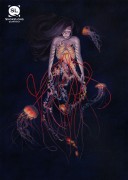The goat that drives most of the action in “Where We Learn to Bang Our Heads Against a Brick Wall” is described as “middle-aged,” which begs the question: Do goats experience midlife crises? Or, more specifically, is this goat in the midst of a midlife crisis? And, assuming so, what three age-inappropriate items is the goat most likely to have acquired to soothe its angst?
You know, I’ve always believed that we humans have appropriated aging from goats: We call children “kids,” nannies tended to be older women, and cranky, bearded, elderly men are often confused with old goats. So maybe we can learn how to deal with middle age and midlife crises from goats? One thing this goat is clearly acquiring is age-inappropriate relationships—pursuing nuns and teenage girls. Others: Maybe plaid and skinny black jeans? A sippy cup (filled with bourbon)? Definitely, Turkish Delight and Winnie the Pooh (though I can’t see how these last two are age-inappropriate).
There’s something understated but at the same time incredibly striking about the setting of this story. You get us into this convent so quietly and unquestioningly that we don’t even realize until perhaps the end exactly how huge a role setting plays in the movement of the story and the story’s characters. How did you find this beautiful setting? Do you have personal experience with convents? Or was the setting here the result of an accident, a challenge, or a dare?
I think setting often gets overlooked or exempted in flash pieces, and in this story, the one thing I was sure of the minute I began writing was the setting. Everything in this story is a figment of my imagination, except the convent. I studied in missionary schools in India and though none of those schools were quite like this one, they’ve haunted me; I even dream of my middle school, though come to think of it, who doesn’t?
This story touches on, among others, themes of survival and frustration—which makes me think not of flash fiction, but of long novels. Are there any favorite long novels that have been frustrating to read but that you’ve survived and finished? Or better yet, are there any long novels you’ve abandoned? How have they impacted your flash?
I might have had something to prove or I was just stubborn or I was a parent-pleaser, but when I was thirteen or fourteen, I decided to read the longest of long novels: War and Peace. I finished it, but remember little from it. I keep meaning to re-read it, but now I’m intimidated. Or lazier.
According to my research, you’ve said in various places that you’re a seeker of the perfect jalebi. Please catalog the characteristics of the perfect jalebi and assess the likelihood (expressed as a percentage) of finding said perfect jalebi in Bloomington, Indiana, where, I understand, you’re working on your MFA.
Best question ever. The three things that make a perfect jalebi:
1) Texture and shape: Crisp on the outside and melting on the inside (just like prose). Wikipedia will tell you that jalebis can be shaped like pretzels. Wrong. The great joy of a good jalebi is its squiggly, intricate shape: the thin bits are all crisp; the lumps become saturated with sugar and fat and have a pleasing chewiness. The best jalebis are mostly thin circles joined together by randomly placed fat, squishy lumps.
2) Color: Neon-ish orange. You can sometimes find insipid-looking golden-yellow jalebis. These are posers. Avoid!
3) Taste: A perfect jalebi will be—at any temperature—cloyingly, addictively sweet.
Chances of finding the perfect jalebi in Bloomington? Just like the winter temperature: -12.
I also understand you have a background in advertising. If you had to write a thirty-second commercial for yourself and your fiction, what would be your slogan and what celebrity (or celebrities) would you hire to deliver it? Would you have a jingle?
A jingle – yes!
A mash-up of
• 38% Channing Tatum (for body and dancing)
• 73% Viola Davis (elegance and acting)
• 29% Jamie Lee Curtis (wit/snark)
• 54% Jamie Fox (singing)
• 41% Aziz Ansari as Tom Haverford
… all singing and performing ABBA’s “Dancing Queen.”



 The SmokeLong Grand Micro Contest (The Mikey) is now an annual competition celebrating and compensating the best micro fiction and nonfiction online.
The SmokeLong Grand Micro Contest (The Mikey) is now an annual competition celebrating and compensating the best micro fiction and nonfiction online.